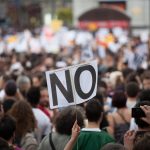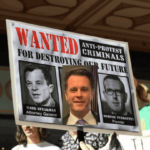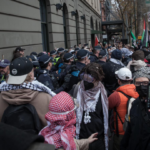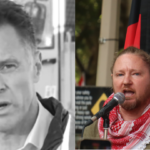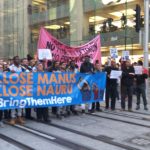Civil Liberties Groups Condemn NSW Government’s Further Encroachment on Right to Protest
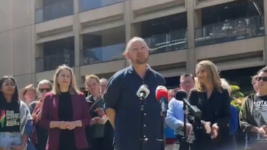
The backlash against New South Wales premier Chris Minns’ suggestion that the NSW Police Force ought to have the capacity to deny rally organisers, who have lodged a protest notification form with the agency, the right to protest if they are unable to pay the cost of deploying police officers when the price of patrolling them is putting a strain on law enforcement finances.
As is the practice of both NSW major party politicians, Minns appeared on 2GB Radio to brainstorm this new policy proposal with shock jock Ben Fordham, and he explained that it is his “view that police should be able to be in a position to deny a request for a march due to stretched police resourcing” because “ultimately, this is taxpayer funds. It can only be distributed in a certain way.”
Minns made these assertions after NSW police made a failed attempt to stop the 6th October 2024 protest against the Israeli state perpetrated genocide in Gaza, which marked 12 months since the carnage began, and the premier not only continued to double down on the antiprotest rhetoric afterwards, but he’s determined to inquire into police resourcing, foreshadowing potential legislative changes.
But while the Labor politician led his party in opposition to support the former Liberal Nationals government’s April 2022-enacted antiprotest regime, which killed unauthorised demonstrations in this state, it appears that at least five of his party colleagues have spoken out publicly against the premier’s fresh antidemocratic statements about public assemblies being too expensive.
While on Thursday, NSW Greens MLC Sue Higginson led a coalition of civil society voices in speaking out against the NSW premier’s further attempts to cancel citizens’ rights to make their voices known in public, as well as to call for a repeal of the 2022 antiprotest laws, with her Greens colleague Kobi Shetty having introduced a bill into the lower house earlier that day to facilitate the regime’s end.
Bucking the authoritarian creep
“The premier has gone too far,” Higginson warned, during a press conference at NSW parliament on Thursday morning. “He has stirred division in his own caucus. He has lost control of the police, and he has angered the people.”
“We will not sit by while the Minns Labor government drags us down the slippery slope of state oppression where our right to protest is threatened,” the Greens justice spokesperson added, “because this is an assault on our democracy.”
The Guardian reported that five Labor MPs had spoken out against Minns’ suggestions that NSW police could shut down protests due to financial reasons.
These included Labor MP Anthony D’Adam and MLC Stephen Lawrence, with the latter asserting that mass protests would occur in a free society, regardless of authorisation, and one only has to look to the precedent set by the first Mardi Gras of 1978 to reveal that this is the case.
Higginson raised a motion in the upper house on Thursday raising state law enforcement’s increasing predilection to shut down protests, which is only being compounded by the premier, while Shetty introduced the Roads and Crimes Legislation Amendment (Offences Repeal) Bill 2024, which seeks to see the 2022 antiprotest regime revoked.
“We know NSW has the worst antiprotest laws in the country,” said Shetty, the NSW Greens member for Balmain. “We cannot be living in a situation where people cannot express their differences. Democracy is not just about the right to vote. It is about people being able to tell the government of the day that they do not agree with the direction they are taking.”
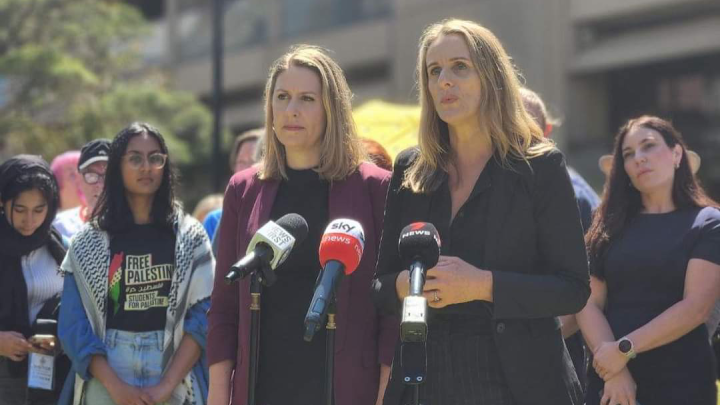
The cost of saturation policing
“Over the last two weeks, we have seen an extraordinary attempt by the premier, by this government, in conjunction with NSW police, to try to deny our rights to protest,” said Palestine Action Group organiser Josh Lees. “We are proud to have organised 53 weeks of mass peaceful protests to stop Israel’s ongoing genocide in Gaza and they’re invasion and occupation of Lebanon.”
The premier has taken issue with the Palestine rallies since they began on a weekly basis a year ago. And after police failed to shut down the 52nd rally, he turned up on 2GB with a new tactic, telling Fordham that the policing of the protests had cost $5.4 million over 12 months, and he considered that the police should be able to refuse them based on cost, as well as to free up resources.
Besides the cost, Minns’ other key reason for shutting down the weekly Palestine rallies has focused on NSW police officers being pulled away from more important duties.
Yet, Police Association of NSW president Kevin Morton told the Guardian that this isn’t true, as the regular police remain on duty to deal with serious crime, whilst most of the officers who work the protests do so for the extra pay.
Lees made the point that blaming organisers for the high cost of policing of protests was deceitful, as they’re not asking for the saturation policing involved, as that’s “the premier’s decision”. Indeed, the 52nd protest had an extraordinary police presence, which is usually top heavy as it is, and Morton outlined that there was “in excess of 900 officers”, who’d usually have had the day off.
And following Minns’ suggestion that protests should be shut down for financial reasons, while the state bumps up officer numbers, Liberal leader Mark Speakman piped in with the idea of user-pays policing, whereby organisers front the bill, which is the tactic NSW police employed in respect of festivals it wanted to shut down circa 2018, in order to make them too expensive to run in this state.
Morton further told the Guardian that most officers policing the event were either user pays, with the state fixing the bill and not the policing agency itself, or those deployed to the Sunday rallies had cancelled rest days, which means penalty rates for both sets of officers. The police boss, however, went on to say that he would support legislative change to make it an organiser user-pays system.
No price on rights
“The idea that democratic rights in this country can be easily taken away on the basis of what a premier says something costs” is quite frightening, said NSW Council for Civil Liberties president Lydia Shelley. And she stressed that so serious is the repressive state of protest laws in this country that her organisation has asked the United Nations to visit Australia to investigate the matter.
The civil society groups, social justice activists and Greens MPs gathered before the press on Thursday were already pushing for the 2022 antiprotest regime to be revoked, but now Minns is attacking the right to hold authorised protests on the basis of cost, while he’s too insisting that saturation policing is the norm, and the Liberals are now raising user pays as an alternative.
Maritime Union of Australia Sydney branch secretary Paul Keating explained that the right to protest is a “fundamental democratic and civil right”, which cannot be equated to a monetary value. But the establishment has “normalised this nationalist right-wing agenda that pervades” the nation’s politics right now to the point that “this is the narrative”. But the truth is protest doesn’t have a price.
“Minns is experiencing some difficulty within his own political party, and it is very clear that he is going to have to start listening to the people on the streets, and the people in his party and all of the people across our communities, because if he doesn’t, it is to his peril,” said Higginson.
“We would like to see a change in regime where the right to protest is enshrined in a system of rights in NSW,” the MLC ended.


